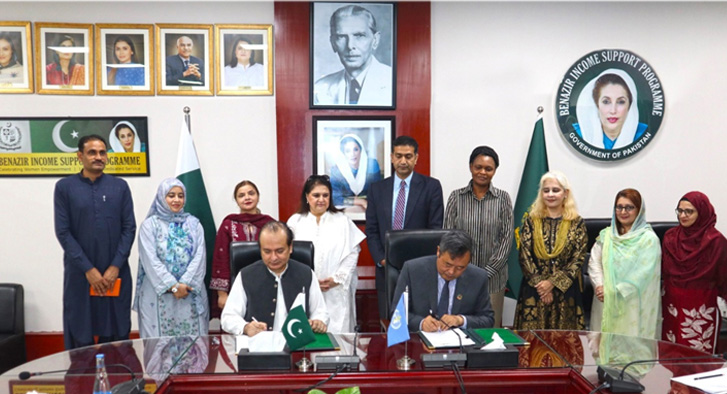
“Together, we are taking a vital step towards combating malnutrition and ensuring a healthier future for our children"
25 September 2024, Islamabad, Pakistan – The World Health Organization (WHO) and the Benazir Income Support Programme (BISP) have signed an agreement to work together to tackle malnutrition in Pakistan. The agreement was signed by BISP Secretary Amer Ali Ahmad and WHO Representative and Head of Mission in Pakistan Dr Luo Dapeng at BISP headquarters in Islamabad.
The partnership aims to implement evidence-based interventions, provide lifesaving treatment to severely acute malnourished children with medical complications and support breastfeeding and nutrition education for mothers and caregivers.
The signing ceremony was attended by BISP chair Ms Rubina Khalid, BISP Director-General Mr Naveed Akbar and BISP’s Director of Conditional Cash Transfers Mr Wiqar Ahmad alongside other dignitaries and officials from BISP and WHO.
Speaking at the event, BISP chair Ms Rubina Khalid underlined the importance of WHO’s role in providing lifesaving medical care to beneficiaries of the programme, while BISP Secretary Amer Ali Ahmad said: “This is a landmark event for BISP, marking a significant step forward in our efforts to enhance the well-being of our beneficiaries. We are committed to strengthening our partnerships with WHO to ensure that the fruits of this collaboration reach those most in need”.
WHO’s Representative and Head of Mission in Pakistan expressed his gratitude to BISP for partnering with WHO: “WHO is honoured to partner with BISP to provide life-saving treatment to more than 75 000 severely acute malnourished children with medical complications as well as protecting, supporting and promoting breastfeeding as a key strategy to prevent stunting”.
“WHO is committed to supporting interventions aimed at reducing stunting in the country which is a priority of the Government of Pakistan,” said Dr Dapeng.
The project will improve the nutritional status and overall well-being of malnourished children across Pakistan.


